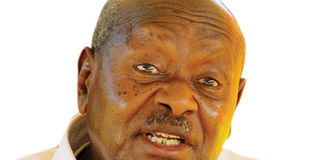Tullow tried to pay Museveni - lawyer

President Museveni
What you need to know:
London court is told company executives considered making payments to the President, and or, financing his re-election.
Top Tullow officials toyed with the idea of making an “undocumented” $50 million (Shs130b) payment to President Museveni before switching to consider financing his re-election campaign, UK media reported on Thursday.
They were quoted in proceedings at ongoing tax arbitration case in London. Officials in Kampala however said they were “unaware” of such gestures.
The Company’s Exploration director Angus McCoss, reportedly told fellow executives in a group email in August 2010, that the firm should pay for an oil licence to “meet the short term needs and demands” of President Museveni, referred to in the correspondence by the acronym M7.
It was not clear whether the money offer was solicited or made voluntarily by Tullow, and neither could we establish if any cash changed hands afterwards.
Deputy Presidential Spokesperson, Ms Lindah Nabusayi, had by press time not replied our Friday email enquiries on the subject.
The Irish Times reported that Tullow executives considered paying the President of Uganda to “help settle a tax dispute against a rival firm”.
Uganda government demanded $404 million in capital gains tax from Heritage for sale at $1.45 billion of its 50 per cent stake in the oil fields to Tullow. Heritage disputes the tax liability.
Tullow, however, paid part of the bill to Uganda before suing both parties in London with the aim of either recovering what it paid from Heritage or Uganda should court decide against the levy.
During the Thursday hearing, Heritage lawyer Kwahar Quereshi argued that Tullow chose to pay the tax his client disputed for their selfish economic interest.
“[Tullow Exploration director] Mr McCoss is saying [in the email] it is worth thinking about meeting M7’s short-term needs and demands, and he has already indicated the things he is addressing is his election campaign,” he said.
“This can only mean one thing: The provision of assistance and funds to Mr Museveni in his election demands,” the Irish Times quoted the defence lawyer as having argued.
Uganda held its perhaps most expensive presidential and general elections in February 2011, which incumbent Museveni won by landslide, but none of the eight candidates has declared the source of the vast monies spent during campaigns.
Tullow Company Secretary Alan Graham Martin, while giving evidence in court this week, shot back that the suggestion that there was an idea to act unlawfully was “outrageous”.
Lawyer Graham said he could not read Mr Angus’s mind to determine what he meant in his email to group executives. “My guess [is] he was using M7 as shorthand for the whole country (Uganda),” he said, “There is no suggestion on Angus’s part that we were somehow going to pay funds to Mr Museveni’s election campaign. I would say that is an outrageous suggestion.”
Yesterday, Information Minister and ruling NRM party spokesperson, Ms Karooro Okurut, said she travelling up country “but I never heard something like that [Tullow financing Museveni’s re-election campaigns].”
Party Treasurer Amelia Kyambadde, who before joining elective politics was the President’s Principal Private Secretary in 2010 when Tullow reportedly made the considerations, said “I have no idea about it.”
Around that time, Tullow had run-ins with government after the Ministry of Energy at the behest of President Museveni demanded it pay the capital gains tax before renewal of its expired exploration licence or any signing new deals.
The company capitulated, making partial tax payments, and regaining the oilfields resulting in the forced February 2012 ‘farm-down’ to China National Offshore Oil (CNOOC) and Total.
Tomorrow, we will explore the behind-the-scenes maneuovres and how UK ministers in London and diplomats in Kampala pressed the President, both in writing and through telephone calls, to guard Tullow’s commercial exploits.



